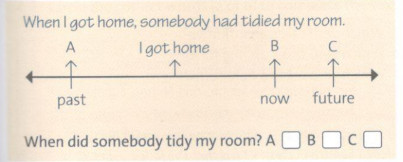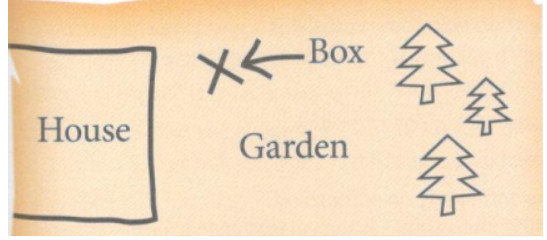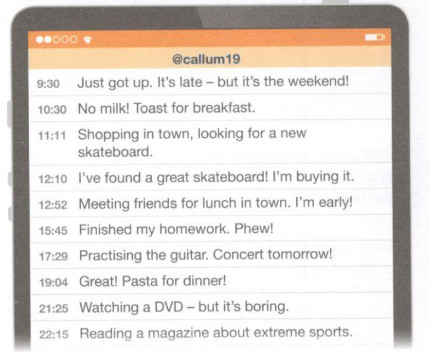Bài 1
1. Read the example of the past perfect. Then look at the timeline and answer the question below.
(Đọc ví dụ về quá khứ hoàn thành. Sau đó nhìn vào dòng thời gian và trả lời câu hỏi bên dưới.)
When I got home, somebody had tidied my room.
(Khi tôi về đến nhà, ai đó đã dọn dẹp phòng của tôi.)


Thì quá khứ hoàn thành dùng để diễn tả một hành động xảy ra trước một hành động khác trong quá khứ:
S + had + V3/ed

A. past
Giải thích:
Hành động về nhà: quá khứ => V2/ed
Hành động dọn phòng: trước quá khứ => had V3/ed
Bài 2
2. Complete the sentences with the past perfect form of the verbs in brackets.
(Hoàn thành các câu với dạng quá khứ hoàn thành của các động từ trong ngoặc.)
1 Tom _____________(take) his bike apart and was trying to fix it.
2 She took out a letter which she ____________(keep) in a drawer for years.
3 When I clicked ‘buy’, the price ____________(increase).
4 I was cross when the computer suddenly switched off, because I ____________(not save) my document.
5 He couldn’t move back to London because he____________(sell) his flat there.

Thì quá khứ hoàn thành:S + had + V3/ed
Nghĩa của từ vựng:
-
take: lấy
-
keep: giữ
-
increase: tăng
-
save: lưu
-
sell: bán

| 1. had taken | 2. had kept | 3. had increased | 4. hadn’t saved | 5. had sold |
1 Tom had taken (take) his bike apart and was trying to fix it.
(Tom đã tháo chiếc xe đạp của mình ra và đang cố gắng sửa chữa nó.)
2 She took out a letter which she had kept (keep) in a drawer for years.
(Cô lấy ra một lá thư mà cô đã cất trong ngăn kéo nhiều năm.)
3 When I clicked ‘buy’, the price had increased (increase).
(Khi tôi nhấp vào "mua”, giá đã tăng lên.)
4 I was cross when the computer suddenly switched off, because I hadn’t saved (not save) my document.
(Tôi thật sự bất ngờ khi máy tính đột ngột tắt vì tôi chưa lưu tài liệu của mình.)
5 He couldn’t move back to London because he had sold (sell) his flat there.
(Anh ấy không thể quay lại London vì anh ấy đã bán căn hộ của mình ở đó.)
Bài 3
3. Complete the text with the past perfect form of the verbs in brackets.
(Hoàn thành văn bản với dạng quá khứ hoàn thành của các động từ trong ngoặc.)

A family in Wales has tried, without success, to get their hands on £5,000 which belongs to them. Six months ago, Richard Williams found a note inside a book. It was from his father, Allan Jones, who (1)_____________ (die) two years earlier. The note told Richard about a metal box with £5,000 inside – money that his father (2)_____________ (save up) during his lifetime. Before he died, his father (3)_____________ (bury) the box in the garden, near the house. Then he (4)_____________ (write) a note for the family. He (5)____________ (draw) a small map too, showing the exact location of the money.
Unfortunately, since Allan’s death, the Williams family (6)_____________ (do) some building work. They (7)_____________ (add) two rooms to the back of house – directly on top of the buried money! ‘If we tried to get the money now, we’d cause too much damage. It would cost more than £5,000 to repair it,’ says Richard, who (8)_____________ (not know) anything about his father’s money until he found the note.

Thì quá khứ hoàn thành: S + had + V3/ed
Nghĩa của từ vựng:
-
die: chết
-
save: tiết kiệm
-
bury: chôn
-
write: viết
-
draw: vẽ
-
do: làm
-
add: thêm
-
know: biết

| 1. had died | 2. had saved up | 3. had buried | 4. had written | 5. had drawn | 6. had done | 7. had added | 8. hadn’t known |
A family in Wales has tried, without success, to get their hands on £5,000 which belongs to them. Six months ago, Richard Williams found a note inside a book. It was from his father, Allan Jones, who (1) had died (die) two years earlier. The note told Richard about a metal box with £5,000 inside – money that his father (2) had saved up (save up) during his lifetime. Before he died, his father (3) had buried (bury) the box in the garden, near the house. Then he (4) had written (write) a note for the family. He (5) had drawn (draw) a small map too, showing the exact location of the money.
Unfortunately, since Allan’s death, the Williams family (6) had done (do) some building work. They (7) had added (add) two rooms to the back of house – directly on top of the buried money! ‘If we tried to get the money now, we’d cause too much damage. It would cost more than £5,000 to repair it,’ says Richard, who (8) hadn’t known (not know) anything about his father’s money until he found the note.
Tạm dịch:
Một gia đình ở xứ Wales đã cố gắng, nhưng không thành công, để có được 5.000 bảng Anh thuộc về họ. Sáu tháng trước, Richard Williams tìm thấy một ghi chú bên trong một cuốn sách. Đó là từ cha anh, Allan Jones, người đã chết hai năm trước đó. Bức thư nói với Richard về một chiếc hộp kim loại với 5.000 bảng Anh bên trong - số tiền mà người chacủa anh đã dành dụm trong suốt cuộc đời của anh. Trước khi mất, bố anh đã chôn chiếc hộp ở vườn, gần nhà. Sau đó anh đã viết một bức thư cho gia đình. Anh ta cũng đã vẽ một bản đồ nhỏ, hiển thị vị trí chính xác của số tiền.
Thật không may, kể từ cái chết của Allan, gia đình Williams đã thực hiện một số công việc xây dựng. Họ đã thêm hai phòng vào phía sau ngôi nhà - ngay trên số tiền đã chôn! "Nếu chúng tôi cố gắng lấy tiền bây giờ, chúng tôi sẽ gây ra quá nhiều thiệt hại. Nó sẽ tốn hơn £5,000 để sửa chữa.” Richard, người đã không biết gì về số tiền của cha mình cho đến khi tìm thấy tờ tiền.
Bài 4
4. Rewrite the following sentences using one past perfect verb and one past simple verb.
(Viết lại các câu sau bằng cách sử dụng một động từ quá khứ hoàn thành và một động từ đơn quá khứ.)
1 I bought a ticket, then I checked the numbers.
After I’d bought a ticket, I checked the numbers.
2 We bought some chicken, then we made dinner.
When ___________________________
3 My parents went out, then I got home.
When ___________________________
4 The sun came out, then we arrived at the beach.
After ___________________________
5 I took my bike apart, then I cleaned every piece.
Advertisements (Quảng cáo)
After ___________________________
6 It got dark, then we arrived at the hotel.
When ___________________________
7 I spoke to my dad, then I applied for the job.
After ____________________________
8 She read the letter, then she began to laugh.
When ___________________________

Trong quá khứ
-
Hành động xảy ra trước: had V3/ed
-
Hành động xảy ra sau: V2/ed

1 I bought a ticket, then I checked the numbers.
After I’d bought a ticket, I checked the numbers.
(Sau khi mua vé, tôi đã kiểm tra các con số.)
2 We bought some chicken, then we made dinner.
When we had bought some chicken, we made dinner.
(Khi chúng tôi đã mua một ít thịt gà, chúng tôi chuẩn bị bữa tối.)
3 My parents went out, then I got home.
When I got home, my parents had gone out.
(Khi tôi về đến nhà, bố mẹ tôi đã đi ra ngoài.)
4 The sun came out, then we arrived at the beach.
After the sun had come out, we arrived at the beach.
(Sau khi mặt trời ló rạng, chúng tôi đến bãi biển.)
5 I took my bike apart, then I cleaned every piece.
After I had taken my bike apart, I cleaned every piece.
(Sau khi đã tháo chiếc xe đạp của mình ra, tôi lau sạch mọi thứ.)
6 It got dark, then we arrived at the hotel.
When we arrived at the hotel, it had got dark.
(Khi chúng tôi đến khách sạn, trời đã tối.)
7 I spoke to my dad, then I applied for the job.
After I had spoken to my dad, I applied for the job.
(Sau khi nói chuyện với bố, tôi đã nộp đơn xin việc.)
8 She read the letter, then she began to laugh.
When she had read the letter, she began to laugh.
(Khi cô ấy đã đọc bức thư, cô ấy bắt đầu cười.)
Bài 5
5. Look at the updates showing what Callum did yesterday. Then write more sentences like the example. Use the past perfect and the past simple.
(Hãy xem các bản cập nhật cho thấy những gì Callum đã làm ngày hôm qua. Sau đó viết thêm các câu như ví dụ. Sử dụng quá khứ hoàn thành và quá khứ đơn.)

1 get up / have breakfast
After he’d got up, he had breakfast.
2 have breakfast / go shopping
________________________
3 buy a skateboard / meet friends for lunch
________________________
4 finish his homework / practise the guitar
________________________
5 have dinner / watch a DVD
________________________
6 read a magazine / go to bed
________________________

Trong quá khứ
-
Hành động xảy ra trước: had V3/ed
-
Hành động xảy ra sau: V2/ed

1 get up / have breakfast
After he’d got up, he had breakfast.
(Sau khi thức dậy, anh ấy đã ăn sáng.)
2 have breakfast / go shopping
After he had had breakfast, he went shopping.
(Sau khi ăn sáng xong, anh ấy đi mua sắm.)
3 buy a skateboard / meet friends for lunch
After he had bought a skateboard, he met friends for lunch.
(Sau khi mua một chiếc ván trượt, anh ấy đã gặp gỡ bạn bè để ăn trưa.)
4 finish his homework / practise the guitar
After he had finished his homework, he practised the guitar.
(Sau khi hoàn thành bài tập về nhà, anh ấy đã tập guitar.)
5 have dinner / watch a DVD
After he had had dinner, he watched a DVD.
(Sau khi ăn tối, anh ấy xem một đĩa DVD.)
6 read a magazine / go to bed
After he had read a magazine, he went to bed.
(Sau khi đọc tạp chí, anh ấy đi ngủ.)
